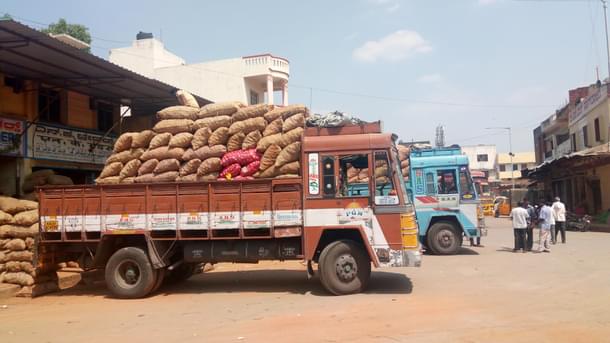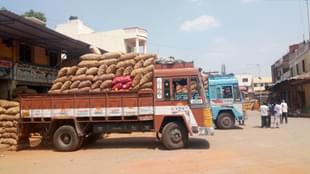Politics
'APMCs Are Hotbed Of Politics, Corruption, Monopoly. They Are Not Working In The Interest Of Farmers': Parliament Panel On Agriculture
M R Subramani
Sep 21, 2020, 12:41 PM | Updated 12:41 PM IST
Save & read from anywhere!
Bookmark stories for easy access on any device or the Swarajya app.


One of the objections raised by the Opposition parties, led by the Congress, against the two Bills that the Narendra Modi got passed by Parliament yesterday (20 September) is that they will 'undermine' the Agricultural Produce Marketing Committee (APMC) mandis.
On Sunday, the Rajya Sabha passed "The Farmers Produce Trade and Commerce (Promotion and Facilitation) Bill" and “The Farmers (Empowerment and Protection) Agreement on Price Assurance and Farm Services Bill" to pave the way for sweeping agricultural reforms.
The third aspect — Essential Commodities (Amendment) Bill — that will complete the efforts to reform the agriculture sector will likely be passed before the current session of Parliament ends.
The argument of the Opposition, now strengthened by the joining of the Shiromani Akali Dal in opposing the Bills, is that ending the APMCs will result in farmers not getting remunerative prices for their produce.
The Opposition has either got it wrong or is misleading people when it says that APMCs will be scrapped.
The government has made it clear that APMCs will co-exist.
MSP and Procurement Operations — Facts
The Opposition parties have also taken this opportunity to say that farmers will be denied minimum support price (MSP) for their crops and the government will stop procurement of crops from farmers.
This again is misleading since, led by Prime Minister Modi, the government has assured that MSP will continue.
In fact, it has to as long as the people in the country are supplied rice, wheat, palm oil, pulses, sugar and other essentials such as kerosene through ration shops.
Also, the government primarily procures only wheat and rice for maintaining buffer stocks.
The government has procured other crops only when their prices have dropped below MSP alarmingly and State governments had sought procurement.
These procurements have never gone beyond cotton, groundnut, pulses such as arhar (pigeon pea), copra and maize (corn).
Also, MSP is only a reference point of a crop’s price so that the government can order market intervention in case of distress sale or the prices plunging.
This means that the MSP does not have statutory provisions to ensure that those who pay the farmers prices lower than MSP are taken to task.
If the Opposition parties have tried to mislead the whole nation on these facts, they are also trying to sweep under the carpet what the Standing Committee on Agriculture said in its sixty-second report in 2018-19.
APMCs reducing competition, leading to cartelization
The report of the committee, headed by former union minister Hukmdev Narayan Yadav, perhaps, sums up the working of the APMCs in just one sentence.
“APMC markets across the country are not working in the interest of farmers due to various reasons such as limited number of traders in APMC market (taking part in the trading process), thereby reducing competition, (leading to) cartelization of traders, undue detection in the name of market fee, commission charges etc,” it said.62nd Report of the Standing Committee on Agriculture 2018-19
More damagingly to those hold briefs for the APMC system, the committee said the APMC has become “a hotbed of politics, corruption and monopoly of traders and middlemen".
Provisions of the APMC Acts are not implemented in their true sense, it said.
“Market fee and commission charges are legally to be levied on traders. However, the same is collected from farmers by deducting the amount from farmers’ net proceeds,” the Parliamentary panel said.
In this context, it is worthwhile to recall why the cotton user-industry in Punjab said it fully supported the agricultural reforms brought in by the government.
The panel said provisions of the APMC Act in some of the States were so restrictive to the interests of farmers that “market fee is levied even when the sale of agricultural produce takes place outside the market”.
The committee highlighted one big headache for the farmer if he/she wanted a choice of APMC markets to sell his/her produce.
“Multiple licences are required for trading in multiple APMC markets, and also multiple times market fee on the same commodity within the State is collected,” it said.
'States Collect Market Fee Even Without Actual Transaction'
In a more stinging attack of the APMCs' functioning, the parliamentary panel said some States collected market fee even without actual trade-transactions taking place.
“The APMCs Acts are highly restrictive in promotion of multiple channels of marketing and competition in the system,” the Hukmdev Narayan Yadav panel concluded.
In a more direct reference to the States' reluctance to improve the functioning of APMCs, the Standing Committee said that a need was felt for further reform in the APMC Act despite States making changes on the Centre’s persuasion.
The committee said it was surprised by the lukewarm response of the States to the reforms in the APMC market.
The Centre had been urging the States to implement the reforms for over 14 years.
“There is an urgent need for radical reforms in the APMC Act in the country if we intend to provide justice to the farmers,” the panel said.
Scarcity of marketing platforms for agricultural produce and mismanagement and corruption in the APMC markets have created a situation where farmers are being deprived of the fruits of their hard-earned labour, leading to low price realisation for their produce, the committee said, stressing the need to create an alternative platform.
It lauded ITC Ltd’s e-choupal initiative, saying the system involved giving a 10 per cent price over and above the modal prices of the previous day at the nearest mandi.
A modal price is the rate at which most trade takes place in a market.
The reality of government procurement and MSP
The standing committee made a significant remark on government procurement and how farmers are being denied fair price, backed by data.
Referring to the period between 2002-2003 and 2017-18, it said the government procured only 26.77 per cent of the wheat and 31.3 per cent of the rice produced during the period.
Small and marginal farmers lack access to government procurement facilities due to various reasons and this led to a situation where they had to sell to middlemen with very little or no profit at all.
In fact, the Hukumdev Narayan Yadav committee wanted the Centre to take up the issue of creating an alternative agriculture marketing platform on a priority basis.
Backed by data, the panel also found that the area covered by an APMC market ranged from 114 sq.km. (in Chandigarh), 116 sq.km. (Punjab) to as huge as 8,889 sq.km. (Jammu & Kashmir) and 11,215 sq.km. (Meghalaya).
Going by this report, it is clear that the Modi government has taken this report seriously and has utilised the first opportunity to usher in the much-required reforms in the agriculture sector that has been talked about for over four decades now.
M.R. Subramani is Executive Editor, Swarajya. He tweets @mrsubramani





